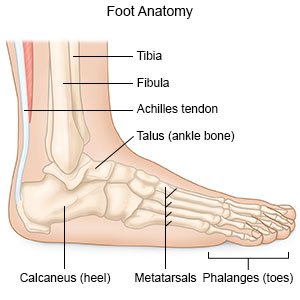Neuroma Excision
Medically reviewed by Drugs.com. Last updated on Apr 6, 2025.
Neuroma excision is surgery to remove a swollen and enlarged nerve called a neuroma, or a Morton neuroma. It usually occurs in the ball of your foot, between your third and fourth toes. The neuroma becomes pinched between toe bones and ligaments and causes pain when you walk. Surgery may be used to relieve pressure from the neuroma, or to remove it.
 |
DISCHARGE INSTRUCTIONS:
Seek care immediately if:
- Your foot, ankle, or leg feels warm, tender, and painful. It may look swollen and red.
- You cannot move your foot or leg.
- You see red streaks coming from the surgery wound.
Contact your healthcare provider if:
- You have a fever or chills.
- You have questions or concerns about your condition or care.
Drugs used to treat this and similar conditions
Qutenza
Qutenza patches are used to treat neuropathic pain associated with postherpetic neuralgia and ...
L-Carnitine
L-Carnitine is used for carnitine deficiency, peripheral neuropathy
Omvoh
Omvoh is used to treat moderate to severe ulcerative colitis or Crohn's disease in adults. This ...
Carnitor
Carnitor is used for carnitine deficiency, peripheral neuropathy
Carnitor SF
Carnitor SF is used for carnitine deficiency, peripheral neuropathy
Phenytoin
Phenytoin is an anti-epileptic drug, also called an anticonvulsant. Learn about side effects ...
Capsaicin topical
Capsaicin information from Drugs.com, includes Capsaicin side effects, interactions and indications.
Carbamazepine
Carbamazepine is used to treat epileptic seizures and nerve pain such as trigeminal neuralgia ...
Levocarnitine
Levocarnitine systemic is used for carnitine deficiency, peripheral neuropathy
Pregabalin
Pregabalin may be used to treat certain types of pain and used in combination with other ...
Medicines:
You may need any of the following:
- Prescription pain medicine may be given. Ask your healthcare provider how to take this medicine safely. Some prescription pain medicines contain acetaminophen. Do not take other medicines that contain acetaminophen without talking to your healthcare provider. Too much acetaminophen may cause liver damage. Prescription pain medicine may cause constipation. Ask your healthcare provider how to prevent or treat constipation.
- Antibiotics help treat or prevent an infection caused by bacteria.
- Take your medicine as directed. Contact your healthcare provider if you think your medicine is not helping or if you have side effects. Tell your provider if you are allergic to any medicine. Keep a list of the medicines, vitamins, and herbs you take. Include the amounts, and when and why you take them. Bring the list or the pill bottles to follow-up visits. Carry your medicine list with you in case of an emergency.
Self-care:
- Rest often after surgery. This will help your incision wound heal.
- Elevate your foot above the level of your heart as often as possible. This will reduce swelling and pain. Prop your leg on pillows to keep your foot elevated comfortably. The swelling should go down within about 2 weeks, but it may take 3 months for all the swelling to be gone.
- Apply ice on your foot for 15 to 20 minutes every hour or as directed. Use an ice pack, or put crushed ice in a plastic bag. Cover it with a towel.
Activity:
- Wear the postoperative shoe as directed for the first 2 to 3 weeks after surgery. Do not put pressure on the ball of your foot when you walk. Put your weight on your heel. Use crutches if directed.
- Do not drive until your healthcare provider says it is okay. This will depend on which foot had the neuroma and what kind of car you drive.
- Ask when you can return to work. You may need to wait up to 4 weeks if you have to walk or do physical activities for your job. You may be able to return to work sooner if you work at a computer or have a less active job.
Follow up with your healthcare provider as directed:
You will need to return to have your stitches removed and your incision wound checked. Write down your questions so you remember to ask them during your visits.
© Copyright Merative 2025 Information is for End User's use only and may not be sold, redistributed or otherwise used for commercial purposes.
The above information is an educational aid only. It is not intended as medical advice for individual conditions or treatments. Talk to your doctor, nurse or pharmacist before following any medical regimen to see if it is safe and effective for you.
Further information
Always consult your healthcare provider to ensure the information displayed on this page applies to your personal circumstances.
